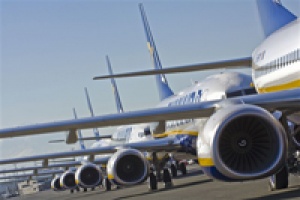Ryanair profits hit by ash cloud

Ryanair has suffered a 24 percent slump in profits after losing €50m of business due to Iceland’s volcanic ash cloud. However Europe’s largest low-cost carrier vowed to continue expanding across the continent, where it sees the potential for most growth.
First-quarter pre-tax profit to €104.6m after accounting for the cost of almost 10,000 flights cancelled in April and May, as well as a 34 percent increase in fuel costs to €287m due to higher oil prices.
However first-quarter revenues rose 16 percent to €896.8m due to an 8 percent increase in traffic, driven largely by Europe, and a rise of 5 percent in fares. The carrier has maintained its forecast for full-year net profit to rise by between 10 to 15 percent and confirmed plans to pay its first ever dividend in October.
Michael O’Leary, chief executive, said: “Despite these volcanic ash disruptions Ryanair continues to increase traffic, yields, and profits, while most of our competitors are cutting capacity and reporting losses.”
Most of Ryanair’s growth is coming from the European continent, O’Leary explained.
ADVERTISEMENT
“We continue to see enormous opportunities to grow our business across Europe as many airports vigorously compete to attract Ryanair’s traffic growth,” he said. “This aggressive competition between airports has resulted in airport unit costs falling by 8 percent, and we plan to announce more lower cost routes and bases later this year.”
However, the airline is reducing capacity in Dublin, blaming a tourist tax introduced last year.
O’Leary also attached the closure of airspace for 18 days in April and May due to the ash cloud as “unnecessary”, and led to the cancellation of 9,400 Ryanair flights, and the loss of almost 1.5 million passengers during the quarter.
He repeated his criticism of a European Union law that requires airlines rather than travel insurance companies or governments to reimburse customers’ hotel and meal bills when their flights are grounded by natural disasters.
“This episode clearly shows that the EU 261 regulations should be amended to include a force majeure clause to relieve airlines of the ‘duty of care’ in cases where the cancellation is not within the airlines’ control,” he said.

